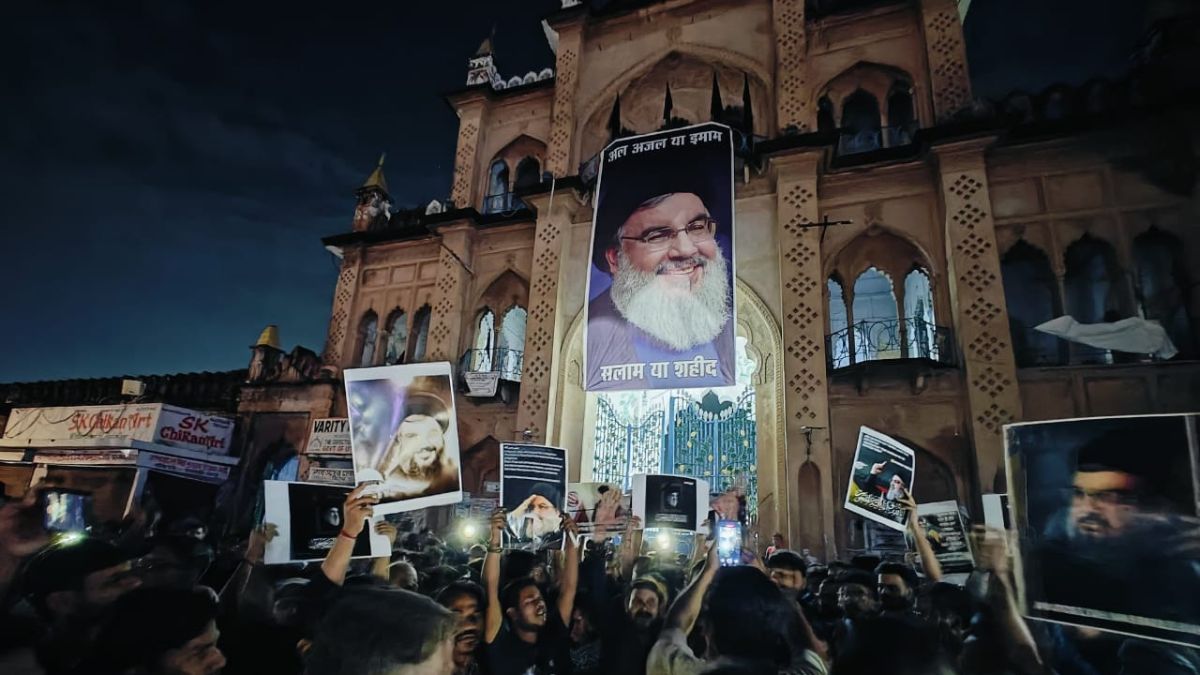- By Imran Zafar
- Mon, 30 Sep 2024 05:48 PM (IST)
- Source:JND
The assassination of Hezbollah leader Hassan Nasrallah has triggered widespread protests and mourning across the world, particularly among Shia Muslim communities. Nasrallah, a prominent figure in the Shia Islamist movement and a staunch opponent of Israel, was killed in an Israeli airstrike, leading to outrage in multiple countries. The shockwaves of his death were felt not only in Lebanon but also in countries like India and Pakistan, where spontaneous protests erupted.
In India, numerous protests and mourning gatherings took place soon after Hezbollah confirmed Hassan Nasrallah's death on Saturday. Among the Indian Shia community, his assassination was perceived as a significant loss. Leading Indian Shia cleric Maulana Kalbe Jawad announced a three-day mourning period, urging people to hoist black flags and close their shops as a sign of respect and solidarity.
Maulana Kalbe Jawad, one of the most influential clerics in India, emphasised the importance of Hassan Nasrallah’s leadership to the global Shia community. He asked Muslims to honour his legacy and stand in unity, reflecting the deep emotional connection many have with the former Hezbollah chief and his ideology.
-1727698537361.jpg)
Why Indian Muslims Are Mourning Hassan Nasrallah's Death?
While some might question why Indian Shia Muslims mourn the death of a Lebanese leader labelled a terrorist by Western nations, the answer lies in Hassan Nasrallah’s symbolic and religious significance. Hassan Nasrallah was not just a Lebanese political leader but also a revered Shia cleric. His support for the Palestinian cause and opposition to Israeli aggression earned him admiration from Shia communities around the world.
Hassan Nasrallah was a strong ally of Iran’s Supreme Leader Ayatollah Ali Khamenei and a dedicated supporter of the Islamic Republic of Iran. He was praised for his role in resisting Israeli oppression in Palestine and for his involvement in combating Daesh (ISIS) in Syria and Iraq.
Many Shia Muslims viewed him as a modern-day symbol of resistance, drawing comparisons to the martyrs of Karbala, who stood against the oppressive Umayyad regime in the 7th century. His efforts to defend Shia interests in the region made him a father figure for many.
Hassan Nasrallah's image was ubiquitous in Shia neighbourhoods during religious processions, and his speeches resonated deeply with those who viewed him as a defender of their faith and community. Nasrallah's death has thus been seen as a personal loss for many Shia Muslims, further fueling their anger toward Israel and its actions.
Protests Against Hassan Nasrallah's Killing In India
In Kashmir, spontaneous protests erupted in response to Hassan Nasrallah’s death. The Shia-majority areas of Srinagar and Budgam saw demonstrators take to the streets, chanting slogans in support of Hezbollah and Palestine while denouncing Israel and the United States. Protesters, including women and children, waved banners and raised their voices in solidarity with the Palestinian cause, expressing their grief over the loss of Hassan Nasrallah.
#WATCH | A protest march was held in Jammu & Kashmir's Budgam against the killing of Hezbollah chief Hassan Nasrallah by the Israel Defence Force (IDF). pic.twitter.com/EhTYAMFKRd
— ANI (@ANI) September 28, 2024
Local religious leaders in Kashmir played a pivotal role in mobilising the community. During Friday prayers, many clerics condemned the ongoing violence in Gaza and the assassination of Nasrallah, emphasising the importance of standing against oppression. One cleric stated, "Our faith teaches us to support those who suffer and Nasrallah’s death is a reminder of the broader struggle faced by Muslims globally."
Protests In Uttar Pradesh
Similar scenes unfolded in Uttar Pradesh, where hundreds gathered in Lucknow's old city area to protest Hassan Nasrallah's assassination. Leading the protests, Maulana Kalbe Jawad reiterated his call for a three-day mourning period, encouraging people to raise black flags and close their shops. The demonstrators, holding portraits of Nasrallah and waving black flags, raised anti-Israel and anti-US slogans, declaring Nasrallah a martyr.
Protest in Lucknow, India for Hezbollah’s former Secretary-General, Sayyid Hassan Nasrallah. pic.twitter.com/XJGbXQ9czR
— Phoenix From The Mount ⚡️🇱🇧 (@phoenicianmount) September 30, 2024
Maulana Kalbe Jawad expressed profound sorrow over Nasrallah’s death, calling it an "irreparable loss.'' He condemned Israel, accusing it of being "the biggest terrorist in the world" and vowed that Nasrallah's legacy would not be forgotten. "His great services and achievements will remain alive in the hearts of people," Jawad said, asserting that Israel’s actions would not go unpunished.
Mourning Gatherings Across Major Indian Cities
In addition to protests, mourning gatherings known as Majlis e Aza were organised in major cities such as Delhi, Mumbai and Hyderabad, all of which have notable Shia populations. These gatherings provided a platform for the community to reflect on Nasrallah’s life and legacy, with top Shia clerics and prominent figures in attendance.
These events were organised to highlight the reverence in which Hassan Nasrallah was held and underscored his influence, not just in Lebanon but across international borders.
